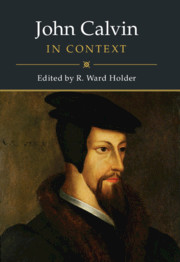Book contents
- John Calvin in Context
- John Calvin in Context
- Copyright page
- Dedication
- Contents
- Contributors
- Acknowledgments
- Abbreviations
- Introduction
- Part I France and Its Influence
- Part II Switzerland, Southern Germany, and Geneva
- Part III Empire and Society
- Part IV The Religious Question
- 19 Western Ideals of Religious Reform
- 20 The Luther Affair
- 21 Religious Colloquies
- 22 The Council of Trent and the Augsburg Interim
- 23 Biblical Scholarship
- 24 The Printed Word
- 25 Polemic’s Purpose
- 26 The Style of Theology
- 27 Baptism
- 28 The Eucharist
- 29 Predestination in Early Modern Thought
- 30 The Challenge of Heresy
- 31 Early Modern Christianity and Idolatry
- 32 Trinitarian Controversies
- 33 Nicodemism and Libertinism
- Part V Calvin’s Influences
- Part VI Calvin’s Reception
- Conclusion
- Bibliography
- Index
- References
20 - The Luther Affair
from Part IV - The Religious Question
Published online by Cambridge University Press: 14 November 2019
- John Calvin in Context
- John Calvin in Context
- Copyright page
- Dedication
- Contents
- Contributors
- Acknowledgments
- Abbreviations
- Introduction
- Part I France and Its Influence
- Part II Switzerland, Southern Germany, and Geneva
- Part III Empire and Society
- Part IV The Religious Question
- 19 Western Ideals of Religious Reform
- 20 The Luther Affair
- 21 Religious Colloquies
- 22 The Council of Trent and the Augsburg Interim
- 23 Biblical Scholarship
- 24 The Printed Word
- 25 Polemic’s Purpose
- 26 The Style of Theology
- 27 Baptism
- 28 The Eucharist
- 29 Predestination in Early Modern Thought
- 30 The Challenge of Heresy
- 31 Early Modern Christianity and Idolatry
- 32 Trinitarian Controversies
- 33 Nicodemism and Libertinism
- Part V Calvin’s Influences
- Part VI Calvin’s Reception
- Conclusion
- Bibliography
- Index
- References
Summary
The Luther Affair, or the causa lutheri, refers to a collection of theological controversies and events following Martin Luther’s posting of the Ninety-Five Theses in 1517. The theological disputes were wide ranging, but they focused mainly on the power and efficacy of indulgences, Luther’s developing understanding of justification by faith alone, and the extent of papal authority. There were three phases in the debates that culminated in Luther’s excommunication by the pope in 1521 and his trial before the Holy Roman Emperor later that spring at the Diet of Worms. The first phase ran from 1513 to 1517 and centered on Luther as he explored the question of justification and its implications for the medieval practice of indulgences. The Ninety-Five Theses, which focused on indulgences, were posted in late October 1517. From 1518 to 1519, Luther defended his new theological positions in lectures, monastic colloquies, public debates, and, most importantly, in short pamphlets, published sermons, and longer theological treatises. Defenders of the church’s authority and tradition met him in those debates and responded with their own theological tracts. The final phase ran from 1520 to 1521, during which time his theological views were further clarified, he was excommunicated, and then was tried in Germany. While theological debates continued for many years, the parameters of those debates and Luther’s legal situation were largely set by the end of 1521. In what follows, we will look at each episode briefly and end by looking at the reactions among University of Paris theologians to the Luther Affair. John Calvin arrived at the University of Paris at the tail end of the Luther Affair, but its reverberations would be felt throughout his education there.
- Type
- Chapter
- Information
- John Calvin in Context , pp. 175 - 182Publisher: Cambridge University PressPrint publication year: 2019

